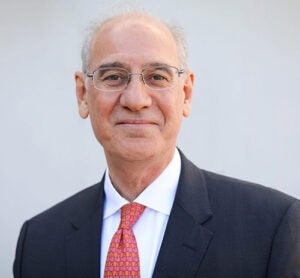Experts at the Health Systems Innovation Lab want to help countries around the world transform how they provide care.
January 24, 2024 – In the fights against COVID-19 and HIV/AIDS, partnerships between governments, private companies, and other entities have played important roles in spurring research and development and scaling up treatment. Now, researchers from Harvard T.H. Chan School of Public Health’s Health Systems Innovation Lab (HSIL) are helping countries around the world utilize this approach to tackle other health challenges.
HSIL launched a collaborative effort with pharmaceutical companies Novartis and Novo Nordisk at the 2022 World Economic Forum in Davos. Director Rifat Atun, professor of global health systems, and colleagues returned to the event this month to present their approach to designing strategic public-private partnerships and measuring their impact with a new tool called target population outputs, and to share recent success stories about collaborations to address cardiovascular disease in Colombia.
High-value health systems

Atun launched HSIL three years ago with the goal of developing innovative solutions for global health problems, with a focus on health systems. “We’re trying to build an interdisciplinary community of innovators in public health,” he said. “All too often, public health focuses on problems. Of course, it is important to identify and measure problems, but we’re not always as good at developing solutions.”
He and his colleagues see strategic public-private partnerships as a way to help countries transition to “high-value health systems,” meaning, they provide “value for money and value for many” by focusing on efficiency, effectiveness, equity, and responsiveness of the public health and health care services provided.
Last fall, HSIL released a report outlining 10 components, such as having digital data systems and the means to measure health outcomes, for measuring whether G20+ countries have high-value health systems. Although the report found slow change at the country level, it identified a number of successful initiatives that could serve as models, such as an online portal in Australia that makes hospital costs data transparent.
In recent months, HSIL has brought together international experts for hybrid panel discussions on how Brazil is using data analytics to address challenges in cardiovascular disease care as part of its transition to a high-value health system; how Brazil and other countries in Latin America can scale up services for cancer care; and how countries around the world can finance cancer care.
Translating research into action
These are just a few of HSIL’s efforts to drive health system transformation around the world. In addition to its research and policy work—through which it collaborates with colleagues in more than 60 countries—HSIL also offers opportunities for student research and mentorship, and hosts an annual international hackathon that last year hosted 166 teams from 37 countries at in-person locations and virtually. Winners joined HSIL’s venture incubation program, where they received mentorship and funding.
This year’s hackathon will be held in April simultaneously at Harvard and multiple locations including Brazil, Chile, Colombia, England, Mexico, Peru, Rwanda, and Switzerland and will focus on harnessing artificial intelligence to develop high-value health systems.
Looking ahead, HSIL is developing more opportunities for policymakers to learn from each other. Atun and colleagues are also working with Charité University Hospital in Berlin, which is affiliated with Humboldt University and Free University Berlin and is one of Europe’s largest university hospitals, on a database of health-related laws and policies from around the world. The researchers plan to use machine learning to identify commonalities. The idea is that if a policymaker wanted to develop, say, an anti-tobacco law, they wouldn’t have to start it from scratch. They could access this resource to pinpoint the components of an effective policy based on their country’s income level and political environment.
This kind of research translation is key to HSIL’s goals, Atun said. “It’s good to generate evidence and to train students. But at the end of the day, one has to ensure that we develop the right policies and that they are implemented.”
Photos: Graphic: iStock / artisteer; Atun: Harvard Chan School
